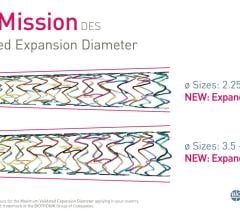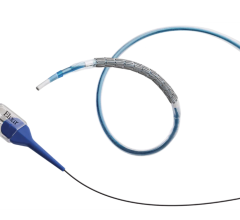
March 18, 2014 — Patients with coronary artery disease who received an Endeavor or Resolute drug-eluting stent from Medtronic Inc. and subsequently interrupted their dual antiplatelet therapy (DAPT) earlier than current guidelines recommend experienced no increased risk of stent thrombosis at one year or more of follow up. Both drug-eluting stents use the drug zotarolimus to reduce the risk of restenosis. This is according to findings from several studies presented at the 25th annual Transcatheter Cardiovascular Therapeutics (TCT) scientific symposium.
Published by the Journal of the American Medical Association (JAMA), the OPTIMIZE study compared one-year outcomes in patients who received the Endeavor drug-eluting stent (DES) and stayed on DAPT for either three or 12 months. It is the largest prospectively designed, multicenter randomized controlled trial to evaluate the clinical implications of DAPT discontinuation after three months as compared with standard 12 months of DAPT following implantation of any single DES.
Conducted at 33 medical centers in Brazil, the OPTIMIZE (OPTIMIzed Duration of Clopidogrel Therapy Following Treatment with the E-ZES in Real-World Clinical Practice) study enrolled 3,119 patients requiring percutaneous coronary intervention (PCI) who received an Endeavor DES and were then equally randomized to either three months (N=1,563) or 12 months (N=1,556) of DAPT. The primary endpoint was net adverse clinical and cerebral events (NACCE, a composite of all-cause death, myocardial infarction, stroke or major bleeding) at one year. The main exclusion criteria were primary or rescue PCI for STEMI (ST-segment elevation myocardial infarction), lesion located in a saphenous vein graft (SVG), and previous PCI with DES.
The study met its primary endpoint by showing noninferiority in NACCE rates at one year between patients treated with three months versus 12 months of DAPT (6 percent vs. 5.8 percent, p noninferiority=0.002) after implantation of an Endeavor DES. In addition, there was no statistically significant increase in the occurrence of ARC (Academic Research Consortium) definite or probable stent thrombosis at one year (0.8% with three months of DAPT versus 0.8% with 12 months of DAPT, p=not significant).
“Our findings show that stopping DAPT after three or 12 months following implantation of the Endeavor DES made no difference in relation to NAACE and stent thrombosis at one year of follow up,” said Fausto Feres, M.D., Ph.D., an interventional cardiologist at the Instituto Dante Pazzanese de Cardiologia in São Paulo, Brazil, and principal investigator of the OPTIMIZE study. “More generally, they also support the notion that stent selection has a bearing on safety outcomes. From the results of the OPTIMIZE study and other new data from the RESOLUTE clinical program that were presented earlier this week, a reevaluation of DAPT duration following implantation of Medtronic’s zotarolimus-eluting stents is probably warranted.”
Further reinforcing the safety profile of zotarolimus-eluting stents, the latest data on the Resolute DES from two analyses presented at TCT also demonstrated favorable clinical outcomes in patients who interrupted their dual antiplatelet therapy early.
Presented by Ajay Kirtane, M.D., chief academic officer and director of the interventional cardiology fellowship program at NewYork-Presbyterian Hospital/Columbia University Medical Center, an analysis of nearly 5,000 patients who received a Resolute DES showed that DAPT interruption after one month of device implantation posed no increased risk of stent thrombosis at three years of follow-up. Of the 684 patients who interrupted their DAPT after one month and before one year, none (0.0 percent) experienced a stent thrombosis out to three years.
Additionally, Deepak Bhatt M.D., M.P.H. is the chief of cardiology at the VA Boston Healthcare System, director of the Integrated Interventional Cardiovascular Program at Brigham and Women's Hospital and the VA Boston Healthcare System, and professor of medicine at Harvard Medical School. He presented a related analysis on an expanded patient pool of nearly 7,000 patients who received a Resolute DES. Consistent with Kirtane’s findings, the risk of stent thrombosis at one year did not increase for those patients who interrupted their DAPT after one month compared to those who did not.
Dual antiplatelet therapy guidelines for patients who receive a drug-eluting stent differ by geographic region, but generally recommend daily compliance for six to 12 months. The applicable guidelines are referenced in the country-specific labeling for each device. Medtronic continues to support adherence to all guidelines related to stenting.
Consistent with ACC/AHA/SCAI guidelines for PCI, the U.S. labeling for the Resolute Integrity DES recommends 12 months of DAPT. Earlier this year Medtronic received approval to update the Resolute Integrity stent’s CE mark labeling to reflect the fact that DAPT interruption or discontinuation after one month posed “low and no increased risk” of stent thrombosis at one year.
Like the Endeavor and Resolute drug-eluting stents, the Resolute Integrity DES also elutes the drug zotarolimus. All three devices feature highly biocompatible polymers.
For more information: www.medtronic.com


 July 02, 2024
July 02, 2024 









